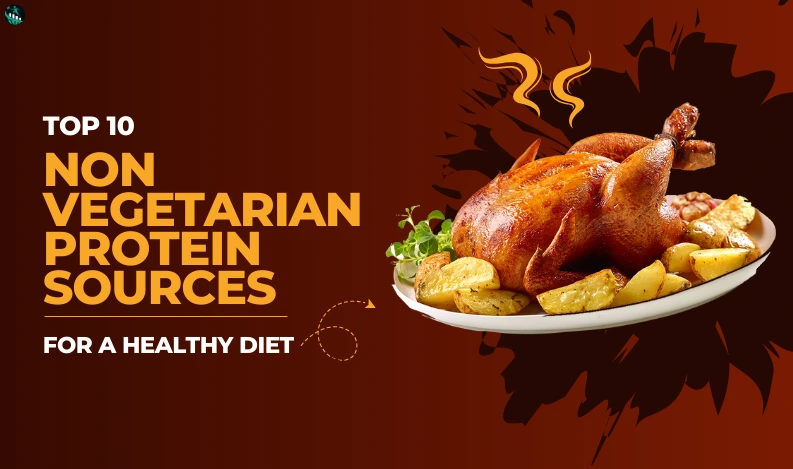
Top 10 Non-Vegetarian Protein Sources for a Healthy Diet
Protein is a vital nutrient required for muscle repair, hormone production, and overall cellular function. Non-vegetarian foods, such as meats, fish, and eggs, are excellent sources of high-quality protein as they contain all nine essential amino acids needed for bodily functions. Additionally, these foods often come packed with other critical nutrients like iron, zinc, omega-3 fatty acids, and vitamins that support energy, immunity, and brain health.
If you're looking to include protein-rich non-vegetarian foods in your diet, here’s an in-depth exploration of the top 10 non-vegetarian protein sources, complete with health benefits and practical usage ideas.
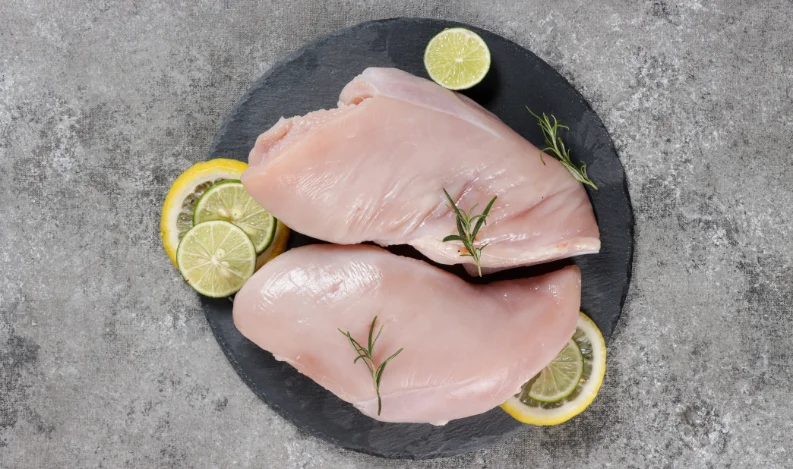
Chicken Breast: The Lean Protein Champion
Key Details:
- Protein Content: ~31g per 100g (cooked)
- Low in fat and calories
- Packed with B vitamins and phosphorus
Chicken breast is one of the leanest and most versatile sources of protein. It’s a staple for fitness enthusiasts and bodybuilders because of its high protein-to-fat ratio, making it an excellent option for muscle building and weight management.
Nutritional Benefits:
Chicken breast is rich in niacin (Vitamin B3) and vitamin B6, which are crucial for energy metabolism and brain health. It also provides phosphorus, which supports bone and teeth health, and selenium, which has antioxidant properties that protect cells from damage.
How to Include in Your Diet:
- Grilled Chicken Salad: Toss grilled chicken breast with fresh greens and vinaigrette for a light, protein-packed meal.
- Baked Chicken: Season with garlic, lemon, and herbs, then bake for a flavorful and low-fat entrée.
- Chicken Stir-Fry: Combine diced chicken breast with vegetables and soy sauce for a quick and nutritious dinner.
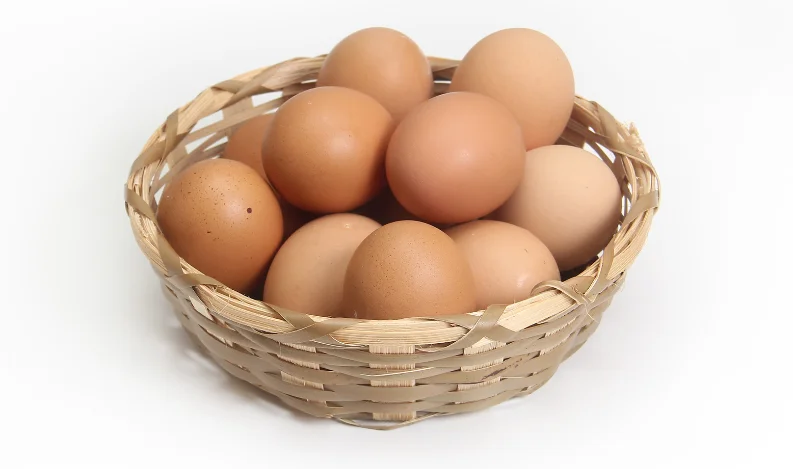
Eggs: The Nutrient Powerhouse
Key Details:
- Protein Content: ~6g per large egg
- A complete protein source with essential vitamins and minerals
- Affordable and easy to prepare
Eggs are one of the most nutrient-dense foods available, containing protein and a host of vitamins and minerals in both the white and yolk. They’re widely regarded as a complete protein source because they provide all essential amino acids.
Nutritional Benefits:
The egg yolk is a treasure trove of choline, a nutrient essential for brain health and liver function. Eggs also provide vitamin D, which supports bone health, and antioxidants like lutein and zeaxanthin, which promote eye health.
How to Include in Your Diet:
- Scrambled Eggs: A quick breakfast option, enhanced with vegetables or cheese.
- Boiled Eggs: Perfect as a snack or chopped into salads.
- Omelet: Add spinach, tomatoes, and onions for a nutrient-packed start to your day.
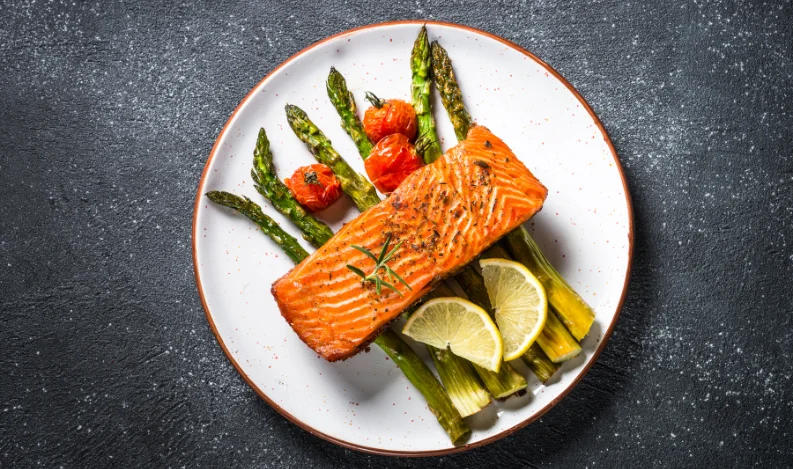
Salmon: The Omega-3 Rich Superfood
Key Details:
- Protein Content: ~25g per 100g (cooked)
- High in omega-3 fatty acids
- Packed with vitamins D and B12
Salmon is often hailed as one of the healthiest fish due to its impressive combination of high-quality protein and omega-3 fatty acids. It’s also low in saturated fats, making it a heart-friendly protein choice.
Nutritional Benefits:
The omega-3 fatty acids (EPA and DHA) in salmon reduce inflammation, improve brain function, and promote cardiovascular health. Salmon is also an excellent source of vitamin D, essential for calcium absorption and bone health.
How to Include in Your Diet:
- Grilled Salmon Fillet: Season with garlic, dill, and lemon for a simple, flavorful meal.
- Salmon Sushi Rolls: Enjoy fresh or smoked salmon in homemade sushi.
- Salmon Patties: Combine canned salmon with breadcrumbs and herbs for a quick, protein-rich snack.
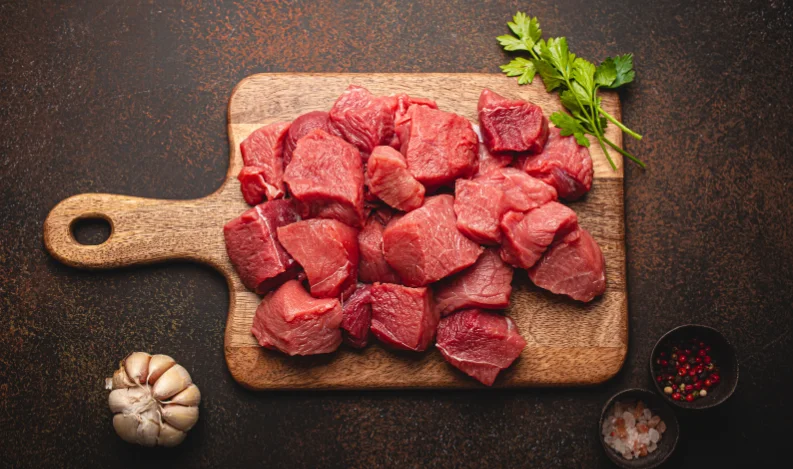
Lean Beef: The Muscle-Building Protein
Key Details:
- Protein Content: ~26g per 100g (cooked)
- High in heme iron and zinc
- Rich in B vitamins for energy production
Lean cuts of beef, such as sirloin or tenderloin, are excellent sources of protein and essential nutrients. Beef is especially beneficial for those who require higher iron levels in their diets, such as athletes and women.
Nutritional Benefits:
Beef contains heme iron, which is more easily absorbed by the body than plant-based iron. It’s also a great source of zinc, which boosts immunity and supports wound healing, and vitamin B12, which aids in red blood cell production.
How to Include in Your Diet:
- Steak with Vegetables: Grill a lean steak and pair it with roasted vegetables for a balanced meal.
- Beef Stir-Fry: Slice beef thinly and cook with soy sauce and veggies.
- Ground Beef Tacos: Use lean ground beef for tacos or chili.

Turkey: The Lean and Sleep-Friendly Meat
Key Details:
- Protein Content: ~29g per 100g (cooked)
- Low in fat and high in tryptophan
- Great for weight management
Turkey is often overshadowed by chicken but is equally nutritious and slightly richer in certain nutrients. It’s a great option for those looking for lean, high-quality protein.
Nutritional Benefits:
Turkey is high in tryptophan, an amino acid that supports serotonin production, promoting better sleep and mood. It’s also rich in selenium, which helps protect cells and supports thyroid health.
How to Include in Your Diet:
- Roast Turkey Breast: Season and roast for a protein-packed main dish.
- Turkey Burgers: Swap ground turkey for beef in your favorite burger recipe.
- Turkey Wraps: Use thin slices of turkey breast in whole-grain wraps.
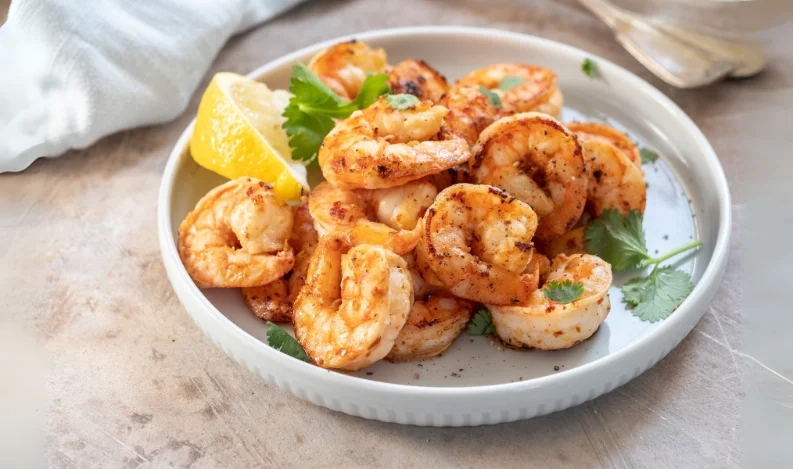
Shrimp: Low-Calorie Protein
Key Details:
- Protein Content: ~24g per 100g (cooked)
- Low in calories and fat
- Rich in selenium and iodine
Shrimp is a low-calorie seafood that provides a high dose of protein and a variety of nutrients. Its delicate flavor and texture make it a favorite in many cuisines.
Nutritional Benefits:
Shrimp is high in iodine, a mineral essential for thyroid function, and selenium, which acts as a powerful antioxidant. It also contains astaxanthin, a compound known for its anti-inflammatory and skin-protecting properties.
How to Include in Your Diet:
- Garlic Shrimp Stir-Fry: Sauté with garlic, olive oil, and vegetables.
- Shrimp Cocktail: Serve boiled shrimp with a tangy cocktail sauce.
- Shrimp Tacos: Add grilled shrimp to tortillas with avocado and lime.
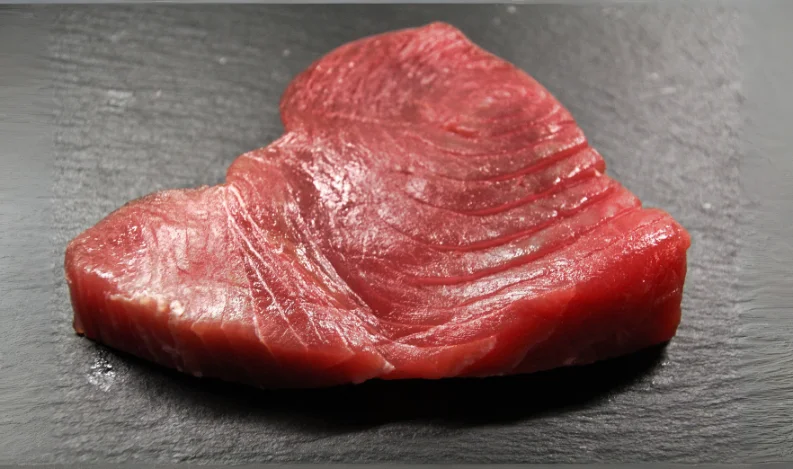
Tuna: The Convenient Protein Option
Key Details:
- Protein Content: ~30g per 100g (canned)
- High in niacin and omega-3 fatty acids
- Convenient and versatile
Tuna is a go-to choice for many due to its convenience and affordability. It’s available fresh or canned, making it accessible for quick, high-protein meals.
Nutritional Benefits:
Tuna is rich in niacin (vitamin B3), which supports healthy skin and nerves. Its high protein and omega-3 content make it excellent for muscle growth and cardiovascular health.
How to Include in Your Diet:
- Tuna Salad: Mix canned tuna with Greek yogurt, celery, and spices.
- Grilled Tuna Steak: Perfect as a main dish with roasted vegetables.
- Tuna Pasta: Combine tuna with whole-grain pasta and a light tomato sauce.
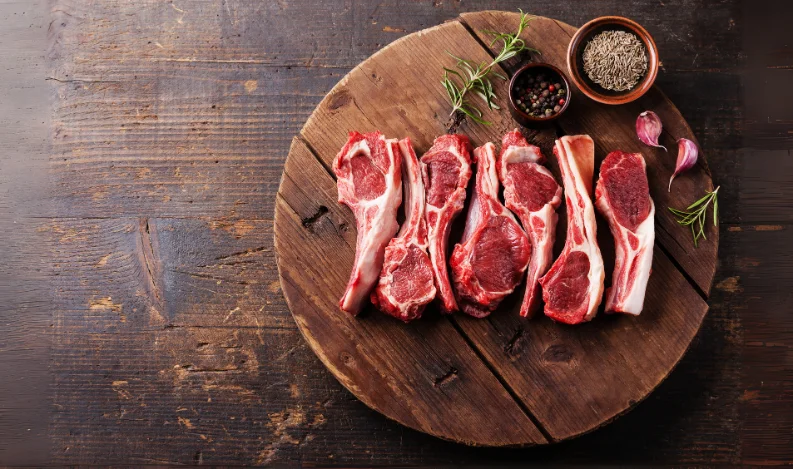
Lamb: Rich and Flavorful Protein
Key Details:
- Protein Content: ~25g per 100g (cooked)
- High in iron and zinc
- Often used in Mediterranean and Middle Eastern cuisines
Lamb is a rich, flavorful source of protein. While slightly higher in fat than chicken or turkey, it provides essential nutrients that support overall health.
Nutritional Benefits:
Lamb is packed with heme iron, which prevents anemia, and zinc, which boosts immunity. It’s also a great source of conjugated linoleic acid (CLA), a fatty acid that may support fat loss.
How to Include in Your Diet:
- Grilled Lamb Chops: Marinate with garlic and rosemary for a hearty meal.
- Lamb Kebabs: Perfect for grilling or roasting with vegetables.
- Lamb Curry: Combine lamb with spices and a tomato-based sauce.
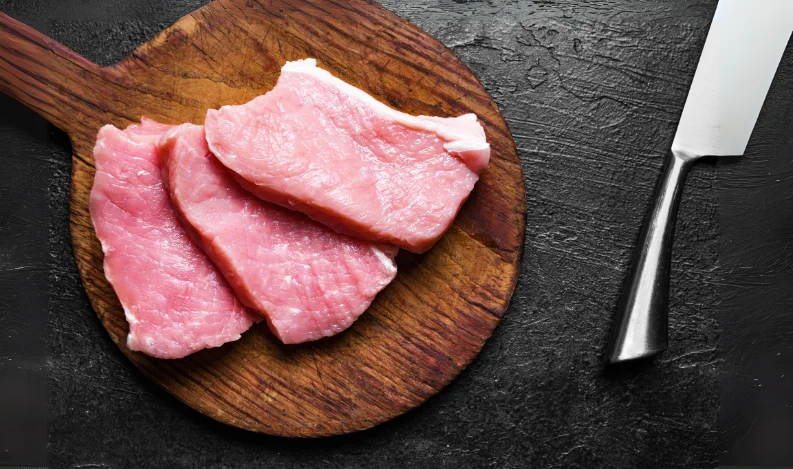
Pork Tenderloin: The Lean Protein Option
Key Details:
- Protein Content: ~26g per 100g (cooked)
- Low in fat and calories
- High in thiamine (vitamin B1)
Pork tenderloin is one of the leanest cuts of pork and is an excellent protein source for those looking to reduce fat intake.
Nutritional Benefits:
Pork is high in thiamine, a B vitamin that helps convert food into energy. It also contains phosphorus, which supports bone health, and selenium for immune function.
How to Include in Your Diet:
- Roast Pork Tenderloin: Slice and serve with a side of roasted vegetables.
- Pork Stir-Fry: Use thin strips of pork with soy sauce and vegetables.
- Grilled Pork Skewers: Perfect for a barbecue or quick dinner.
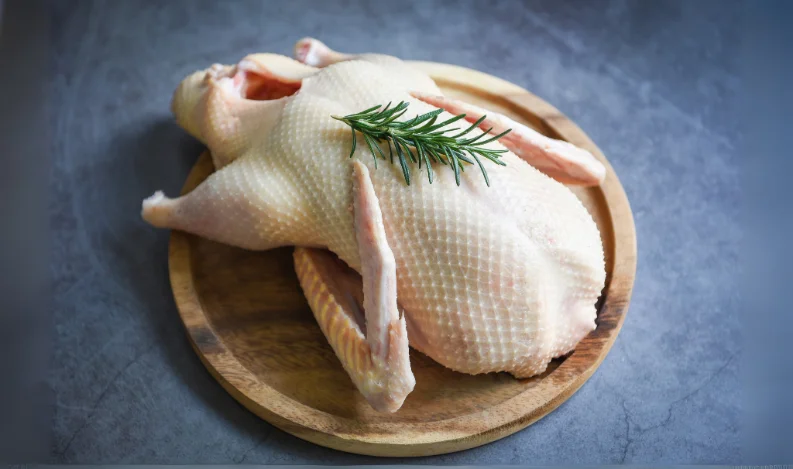
Duck: A Protein-Rich Treat
Key Details:
- Protein Content: ~28g per 100g (cooked)
- High in iron and selenium
- Juicy and flavorful
Duck is a rich and protein-dense poultry option often featured in gourmet dishes. While it’s higher in fat, much of it is unsaturated, contributing to heart health.
Nutritional Benefits:
Duck is an excellent source of iron, beneficial for preventing anemia, and selenium, which supports metabolism and immunity. Its fat content is rich in monounsaturated fats, similar to olive oil.
How to Include in Your Diet:
- Roast Duck Breast: Serve with a fruity glaze, like orange or cherry.
- Duck Stir-Fry: Pair duck with Asian-style vegetables and soy sauce.
- Duck Confit: A slow-cooked, flavorful option for special occasions.
Conclusion
Non-vegetarian protein sources provide a wide variety of nutrients that promote overall health, from lean chicken and turkey to omega-3-rich salmon and flavorful lamb. Incorporating these foods into your diet ensures a balanced intake of protein, healthy fats, and essential vitamins and minerals. Experiment with different recipes to enjoy these delicious and nutritious options in your meals.
Also Read:-



Recent Comments: